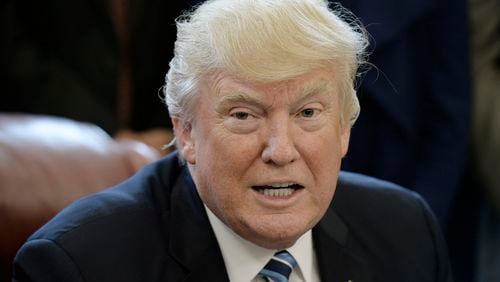Tuesday’s election results — which gave Georgia Democrats a reason to celebrate — have created a cottage industry of analysts trying to figure out what they mean.
Some in the GOP think their party may need to back away from President Donald Trump while others say not enough has been done to embrace the commander-in-chief.
Focus is what’s needed, state Rep. Buzz Brockway says.
“Democrats are energized and united behind the single purpose of defeating Republicans and halting Trump,” said Brockway, who is running for secretary of state. “Republicans are neither united nor energized. If the GOP doesn’t get a unifying purpose, we’ll lose in 2018.”
Meanwhile, Brandon Phillips, a former Trump campaign chief in Georgia, sees a need to grow closer to the president.
“It’s what our folks want,” he said, invoking Trump’s recent conflicts with U.S. Sens. Bob Corker of Tennessee and Jeff Flake of Arizona. “A base never rallies behind lukewarm.”
That’s an idea state Sen. Michael Williams — who was the first Republican legislator in the state to back Trump’s candidacy — can get behind.
Williams, who is running for the GOP nomination for governor, says Republicans lost the race for Virginia governor because the party chose a member of the establishment, former Republican National Chairman Ed Gillespie, over a candidate more in line with Trump.
But party unity could be elusive as various Republicans vie for higher office in next year’s elections.
As an example, Williams threw blame at former state Sen. Hunter Hill for giving Democrats an opportunity to seize his seat. (Two Democrats won spots in December’s runoff in state Senate District 6.) Williams said that Hill, by vacating his office to concentrate on his own run for the GOP nomination for governor, “harmed the conservative cause for all Georgians.”
A spokesman for Hill, Cody Hall, responded that Hill resigned because his constituents deserved a lawmaker who “could focus solely on the needs of the district.”
Meanwhile, Hall made just the opposite claim about Williams, making a case that the senator from Cumming will bring a “circus act” to the legislative session that begins in January in an effort to call attention to himself and his bid for higher office.
“The people of Forsyth County deserve better,” Hall said, “and the people of Georgia certainly deserve better in their next governor.”
- Support for medical marijuana: On another front in the GOP race for governor, Williams, so far, has been the only candidate who publicly favors cultivation within the state of marijuana for medicinal purposes.
He stepped up his advocacy this past week. His schedule included an appearance in front of members of the National Organization for the Reform of Marijuana Laws, a marijuana legalization group, and a “rally for cannabis eligibility for veterans with PTSD.”
Williams calls his support “extremely personal” and says it’s rooted in his father’s diagnosis with severe bipolar disorder after he served in the Vietnam War. Williams’ father committed suicide when Williams was 14, and the senator said that today he would have likely been diagnosed with post-traumatic stress disorder.
Georgia law allows people suffering from more than a dozen illnesses to register with the state and possess up to 20 ounces of cannabis oil. But because the state doesn’t allow in-state cultivation, families who obtain medical marijuana from other states risk defying federal law for transporting the drug across state lines.
- Going pro: The Georgia chapter of the Sons of Confederate Veterans will have pros making its case in the next legislative session, when lawmakers could take up the question about how to treat Rebel monuments.
Tim Pilgrim, the Georgia division adjutant, announced in an email to the group’s members that “a professional lobbying firm” has been hired, but he did not identify it.
Whoever it is will likely be busy trying to preserve the state’s oversight of the statues, obelisks, plaques and assorted other markers commemorating the Confederacy and those who fought for it.
Two Democratic state lawmakers, Sen. Elena Parent of Atlanta and Rep. Mary Margaret Oliver of Decatur, say they intend to introduce legislation that would permit local governments to determine the fate of monuments on their ground.
- No time for "religious liberty"? State Sen. Renee Unterman offered a little more evidence that the state's pursuit of Amazon's second headquarters may prevent "religious liberty" from making much of a splash at the upcoming legislative session.
During an interview with Denis O’Hayer of WABE (90.1 FM), Unterman indicated that there might not be much time for religious liberty legislation while also boasting a bit about Georgia’s business climate.
“I think it’s going to be a very short session,” said Unterman, who has voted for religious liberty bills in the past. “I don’t think these complicated issues are going to have time to get resolved. We are in the business of running the state of Georgia and doing it to the best of our ability, to put Georgia at the forefront.
“We’re No. 1 in the nation for site development. We’ve been that way for five years now. We’re very proud of our record. Are we going to derail that record on one specific issue? The answer is no. I’m not going to. I don’t think the leadership is going to.”
In recent weeks, Gov. Nathan Deal’s chief of staff, Chris Riley, and state House Speaker David Ralston have shown little support for any renewed effort to pass religious liberty legislation during the session that begins Jan. 8.
Riley implored the four Republicans currently running to replace his boss — who have all pledged to sign religious liberty legislation into law if they win the governor's race — to show caution about what they say about any such bill out of concern it could scare off Amazon.
Ralston, a Republican from Blue Ridge, has said he just hasn't "really thought about" the possibility of a religious liberty bill, even though it's a topic that has dominated discussion in his chamber for several years.
- Protection sought for embryos: State lawmakers are facing pressure from Georgia Right to Life to define embryos as constitutionally protected persons. The move follows the Georgia Supreme Court's decision to not take up a lower court ruling that denied a Peach County woman's right to custody of three frozen embryos achieved through in vitro fertilization – over the objections of her estranged husband.
- Candidates, endorsements, etc.:
— Cobb County Sheriff Neil Warren backed state Sen. Josh McKoon's bid for secretary of state at a recent Cobb GOP breakfast. "I've got mixed emotions about this and I'll tell you why: There's no doubt in my mind he's going to be a good, outstanding secretary of state," Warren said. "But he is an excellent state senator. I hate to see him leave."
— Republican Jim Kingston, the son of former U.S. Rep. Jack Kingston, was a potential candidate for Georgia insurance commissioner. But he said he's backing Jay Florence. About a half-dozen candidates are running for the job now held by Ralph Hudgens, a Republican who is not seeking another term.
— An anti-gun violence group founded by former U.S. Rep. Gabrielle Giffords has picked a side in the race for the Democratic nomination for governor, backing former state House Minority Leader Stacey Abrams. Giffords, who survived a 2011 mass shooting that killed six people, said Abrams will "work to build support for common-sense measures that stop individuals who are in danger of hurting themselves or others" from obtaining guns.
The week in Georgia politics
Here’s a look at some of the political and government stories that The Atlanta Journal-Constitution’s staff broke online during the past week. To see more of them, go to http://www.myajc.com/georgia-politics/.
About the Author








